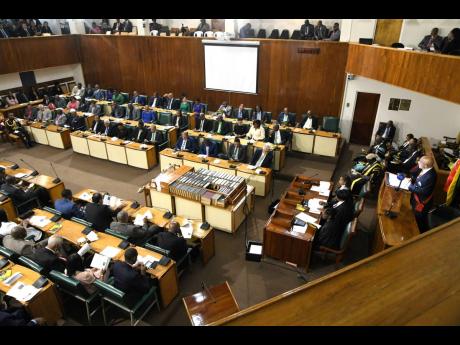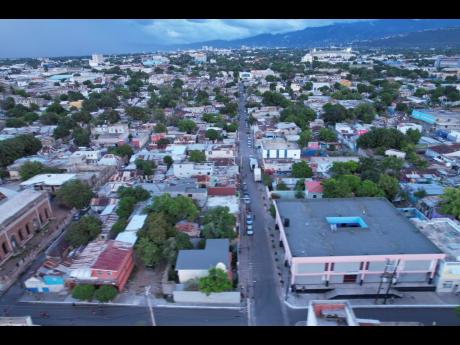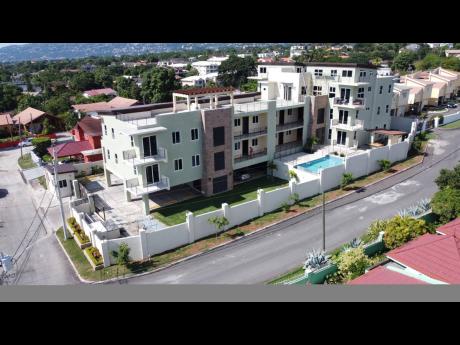Patricia Green | Will parliamentarians’ salary increase boost development projects?
“... Sun a shine an pot a bwile, but ... Things no bright, bickle no nuff ... Rain a fall, river dah flood, but, ... Water scarce and dutty tough ...” penned Louise Bennett-Coverley. This is likely to be the refrain of teachers, nurses, firefighters, police officers, and public servants offered 20-120 per cent salary increases. Generating street protests, Prime Minister Andrew Holness on May 22 announced 250-300 per cent salary increases to the political directorate, including the governor general.
Although official job descriptions and performance criteria for parliamentarians are non-existent, the PM outlined that ministerial salaries are linked to that of the chief executive officer or permanent secretary (PS) of government ministries, being J$1 higher. He listed some members of parliament (MPs) activities: working internationally and locally; being advocates and champions of constituencies; handling administrative, legislative, policy, dispute resolution, arbitration, and ceremonial duties. Critically, the PM emphasised a reporting procedure between the political directorate and the public service, “... the permanent secretary reports to the minister, is accountable to the minister, and accountable to Parliament, and that is how the Cabinet is established in the constitution as the chief policymaking and executive arm of the Government, to get things done ...”.
On the contrary, Section 69 of the 1962 Jamaica Constitution states policy as the principal role of a PM and other MPs, also “... .general direction and control of the Government of Jamaica ...”. The Constitution respects that as elected members, the continuity for national development would reside in the public service as under Sections 123-126 of the Constitution, including the appointment of the PS.
In 1991, a committee headed by Prof. Carl Stone was appointed to advise the Jamaican Government on the criteria for the performance, accountability, and responsibilities of elected parliamentarians. These have never been implemented. This report stresses that adequate representation of community interests requires that the MP spend a lot of time studying and examining the problems of the constituency’s communities. Further, each MP should draw on the leadership, technical, and human resources of various civic, community, and citizen associations and organisations, professional skills, institutional supports, and resource persons. Are these being undertaken by parliamentarians nationally to warrant salary increases? The Stone Report further reiterates that only a small minority of MPs have either the institutional, leadership, professional, or the human resource supports to develop the level of community representation likely as a “... most vital and critical input into the country’s development planning ...”.
VISION 2030
Based on widescale consultation, Jamaica Vision 2030 encapsulates the Jamaica national-development strategy. Another consultation resulted in the 2017 National Environment and Planning Agency (NEPA) Kingston and St Andrew and the Pedro Cays Provisional Development Order. With ministerial reshuffling and electoral vote changes, are parliamentarians capable of offering long-term implementation accountability? Therefore, would Jamaica be substituting long-term ‘national’ development for one that may be construed as shortterm ‘political’ development?
In rural and urban settings, development projects are increasing, with negative impacts on Jamaica’s natural environment. Approvals by agencies contravening their own protection guidelines and policies, even disregarding Development Orders (albeit some being ‘Provisional’), are these ‘political’? Citizens become forced into lengthy and costly litigations. About Hanover, the Gleaner story, ‘Court rules in favour of Industry Cove residents,’ on September 25, 2022, said that “... the Supreme Court has quashed the National Environment and Planning Agency’s (NEPA’s) decision to grant an environmental licence ... despite concerns by residents of the area, Prime Minister Andrew Holness broke ground for the 63-unit housing solution in August 2018 ...”.
The PM emphasised PS reporting to ministers. Would this explain why some governmental entities seem to contravene development policy? Let us examine some Gleaner headlines: ‘Illegal! Court slaps KSAMC, NEPA for authorising Birdsucker development,’ December 17, 2020; ‘Court overturns another developer’s permit: Judge slams KSAMC, environment regulator for breaking law in Dillsbury project approval,’ February 22, 2022. Therefore, what justifies political salary increases even to mayors, including to the chief executive officer of the Kingston and St Andrew Municipal Corporation (KSAMC)?
GLOBAL
Parliamentarian salary increases are global. Singapore enforces strict environmental development also strong political performance criteria, and globally, has the highest-paid PM. Its government website states that this should discourage corruption of top ministers and attract the brightest to serve Singaporeans. The New Zealand PM receives the second-highest salary.
Rachel Sadler wrote on January 8 in NewsHub, ‘How Jacinda Ardern’s and New Zealand MPs’ salaries compare to overseas politicians.’ In 1976, teachers were paid NZ$12,370, and a backbench MP was paid a total of NZ$14,097 in salary and allowances. Currently, an experienced secondary teacher’s salary is NZ$90,000 while the lowest-paid and “most inexperienced” backbench MPs get NZ$163,961. The second and third place highest average salaries are information and communication technology change manager (NZ$157,723) and architect (NZ$155,006). By January 23, Eliav Breuer in the Jerusalem Post shared that ‘Knesset members receive “just” 5.1 per cent salary raise due to cost of living crisis.’ I added World Bank and UN data to these sources to make some comparisons.
Regardless of whether PM Holness accepts the pay increases, comparatively, Jamaica has the lowest population, lowest gross domestic product (GDP), yet the projected highest PM salary to citizen ratio: 1) Jamaica approximates 67 cents burden on each Jamaican citizen (population three million, GDP US$0.015 trillion); 2) Singapore approximates 37 cents burden on each Singaporean (population six million, GDP US$0.397 trillion); 3) The United States, 11 cents on each (340 million, GDP US$23 trillion); 4) Canada, seven cents on each (38 million, GDP US$2 trillion); 5) New Zealand, 5.8 cents on each (five million, GDP US$0.25 Trillion); 6) UK, three cents on each (50 million, GDP US$3 trillion); 7) Israel, two cents on each (8.8 million, GDP US$0.488 trillion).
The PM announced a Cabinet reshuffle on May 22. Why was there silence about the Housing portfolio? Teachers, nurses, firefighters, police officers, and public servants are in dire need of affordable housing, made more acute because of their comparatively marginalised salary increases alongside the political directorate. Who are intended beneficiaries of various residential developments appearing to contravene policy in Kingston and St Andrew?
The Gleaner headlines some under judicial review: ‘$120-million Acadia development on shaky ground after judge sends ‘strong message,’ March 5; ‘$100m Golden Triangle developer escapes ‘rude awakening’ after demolition order overturned,’ April 2; ‘Impossible to fix’: Juliet Holness tells court her $800m housing project doomed to fail if issues with access road not addressed,’ May 18.
Interestingly, Israel is one of only five countries without a written constitution, including Saudi Arabia, New Zealand, Canada, and the United Kingdom, stated Crystal Jones May 22, in the Jerusalem Post. The Jamaica Government is considering constitutional reform to remove its UK king to appoint a president. With newly appointed political salary increases amid disparities, some Jamaicans ask, “Yuh a swap black dawg fi monkey”?
Patricia Green, PhD, a registered architect and conservationist, is an independent scholar and advocate for the built and natural environment. Send feedback to patgreen2008@gmail.com and columns@gleanerjm.com .



